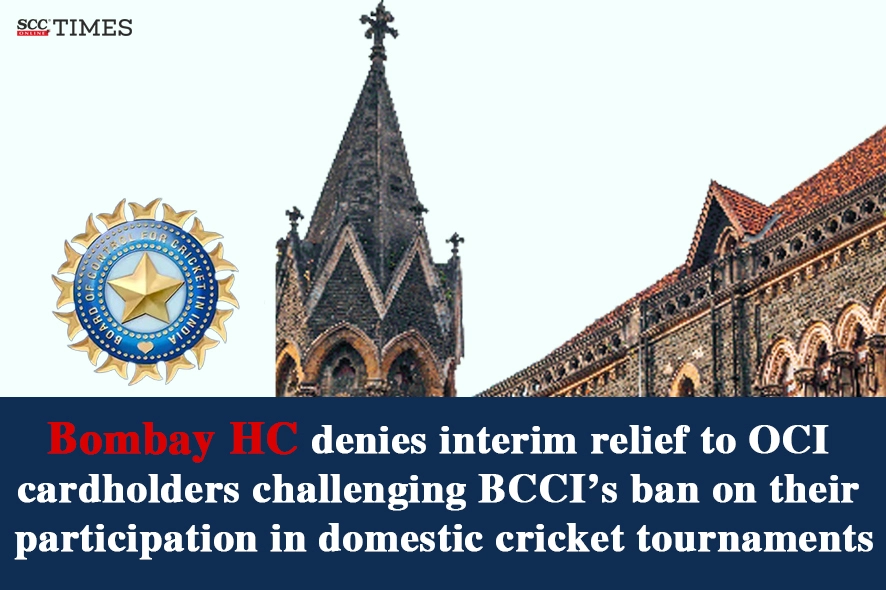Bombay High Court: An interim application was filed by the petitioners to seek mandatory injunction against the resolution passed by Board of Control for Cricket in India (‘BCCI’) which allowed only Indian citizens to play in the domestic cricket tournaments. The Division Bench of Advait M. Sethna andM. S. Sonak, JJ., held that no prima facie case of manifest arbitrariness had been made out, since the clear objective behind the resolution passed by BCCI was to pool the players who could play for the National Cricket Team wherein only Indian national were allowed to play. The Court also opined that the impact of granting such interim relief to the petitioners on the players on the players who were Indian citizens, was unknown. Therefore, the Court refused to grant the interim mandatory injunction to the petitioners.
Background
The BCCI passed a resolution on 18-12-2023 which stated that the players, playing in domestic tournaments in India must have Indian citizenship which effectively meant that the players who held Overseas Citizen of India (‘OCI’) cards would not be allowed to play the domestic tournaments after the resolution was passed. The petitioner, who were OCI cardholders and were playing in domestic tournaments were thus disqualified due to the implementation of the said resolution.
Aggrieved by the same the petitioners filed a writ petition before the present Court, wherein they also filed an interim application for the grant of interim mandatory injunction.
Analysis, Law and Decision
The petitioners contended that such resolution of BCCI was manifestly arbitrary and was against their right to play sports as a part of personality development which is enshrined in Article 21 of the Constitution. It was further informed that the petitioners have applied for the Indian citizenship and application for the same was pending.
The Court observed that the BCCI was held not to be a State, under Article 12 of the Constitution. However, when the BCCI discharged public functions, it would be amenable to the writ jurisdiction of a Constitutional Court.
The Court opined that even if it was considered that by regulating the players who could play the domestic tournaments, the BCCI was discharging public functions, even then it could not be said that the resolution passed by BCCI was arbitrary, warranting grant of extraordinary relief of an interim mandatory injunction. The Court pointed out that the BCCI has reasoned that the objective behind such resolution was to select players for the national team as only Indian citizens were allowed to play for the national team. Therefore, there was no question of allowing those, who were not Indian nationals, to participate in domestic tournaments, as only the Indian citizens could ultimately form the pool for selection to the national team.
The Court emphasised that the selection of petitioners at the domestic tournament level might come at the cost of an Indian Citizen player, who would then miss an opportunity to be considered at the international level. The Court also stated that at this stage the impact of the order on the Indian players could not be fathomed. Thus, a case of prima facie manifest arbitrariness was not made out. A case with a standard higher than the normal prima facie case could not be established. It was also stated that the question of irreparable prejudice could not be considered only from the perspective of the petitioners.
Accordingly, it was held that no prima facie case of manifest arbitrariness has been made out, since the objective behind the resolution was to allow only Indian nationals to play for the National Cricket team who were pooled from the players playing the domestic cricket and also the impact of granting such interim relief to the petitioners was unknown. Therefore, the Court refused to grant the interim mandatory injunction to the petitioners. Additionally, the Court opined that the BCCI must endeavour to take an expeditious decision on such representation because they are dealing with the hopes and aspirations of young children, who we presume have been working hard to excel in cricket. The BCCI may also consider whether any relief could be provided to these children, given the circumstances in which they are placed.
[Kevin Kartik v. BCCI, 2025 SCC OnLine Bom 3633 decided on: 26-9-2025]
Advocates who appeared in this case:
Advocate for the Petitioners: Kunal Cheema, Datta Mane, Advocates
Advocate for the Respondents:Birendra Saraf, Senior Advocate; Ankit Lohia, Ranjit Shetty, Tejas Gokhale i/by Argus Partners


